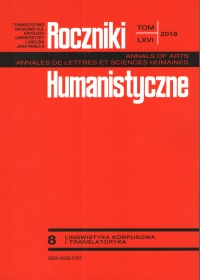Modeling of the Context of Terminological Units for the Needs of a Scientific Writing Aid Tool in the Biomedical Field
Abstract
In this paper we propose a modeling of contextual information around a terminological unit, for the needs of a scientific writing aid tool in the biomedical field. We focus more specifically on the modeling of significant phraseic contexts that we formalize as semantically characterized argument patterns. This modeling is based on a large corpus of biomedical scientific articles and relay on semantic types specified in a domain ontology, Unified Medical Language System.
References
Aluísio Sandra M., Barcelos Iris, Sampaio Jandir, & Oliveira Osvaldo N., 2001, « How to learn the many unwritten “rules of the game” of the academic discourse: a hybrid approach based on critiques and cases to support scientific writing » [in :] Advanced Learning Technologies Proceedings. IEEE International Conference, 257-260.
Barnes Caroline, Boutron Isabelle, Giraudeau Bruno, Porcher Raphael, Altman Douglas G., & Ravaud Philippe, 2015, « Impact of an online writing aid tool for writing a randomized trial report: the COBWEB (Consort-based WEB tool) randomized controlled trial » [in :] BMC medicine, 13(1), 1.
Kinnunen Tomi, Leisma Henri, Machunik Monika, Kakkonen Tuomo, & Lebrun Jean-Luc, 2012, « SWAN-scientific writing AssistaNt: a tool for helping scholars to write reader-friendly manuscripts » [in :] Proceedings of the Demonstrations at the 13th Conference of the European Chapter of the Association for Computational Linguistics, 20-24.
Kübler N. & Pecman M., 2012, « The ARTE bilingual LSP dictionary: From collocation to higher order phraseology » [in :] Electronic Lexicography, S. Granger & M. Paquot (eds). Oxford: Oxford University Press, 187-209.
Lebrun Jean-Luc, 2011, « Scientific writing 2.0: a reader and writer's guide », World Scientific.
Lerat Pierre, 1995, « Langues spécialisées », PUF, Paris.
L’Homme Marie-Claude, 2016, « Terminologie de l’environnement et Sémantique des cadres » [in :] Congrès mondial de linguistique française (CMLF 2016), Tours, France.
L’Homme Marie-Claude, 2014, « Why lexical semantics is important for e-lexicography and why it is equally important to hide its formal representations from users of dictionaries » [in :] International Journal of Lexicography 27(4).
L’Homme Marie-Claude, Robichaud Benoît & Leroyer Patrick, 2013 « Encoding collocations in DiCoInfo: From formal to user-friendly representations » [in :] Electronic Lexicography, Oxford : Oxford University Press, 211–236.
Thomas Izabella, 2016, « Ecrire en langues spécialisées : méthodes et outils du traitement automatique des langues au service de l’autonomie des rédacteurs », HDR, Université de Franche-Comté, UFR des Sciences du Langage, de l'Homme et de la Société.
Yan Rui, Hatier Sylvain, 2016, « L’extraction et la modélisation de patrons lexico-syntaxiques pour leur enseignement en FLE : un exemple à partir du verbe montrer » [in :] Linguistik Online 78 (4).
Volanschi Alexandra, Kübler Natalie, 2010, « Building an electronic combinatory dictionary as a writing aid tool for researchers in biology » [in :] Sylviane Granger, Magali Paquot (eds.). e Lexicography in the 21st Century: New Applications, New Challenges, Louvain-la-Neuve : Presses Universitaires de Louvain, 343-355.
Wandji Ornella, L’Homme Marie-Claude, Grabar Natalia, 2013, « Discovery of Semantic Frames for a Contrastive Study of Verbs in Medical Corpora » [in :] Terminology and Artificial Intelligence, TIA.
Copyright (c) 2018 Roczniki Humanistyczne

This work is licensed under a Creative Commons Attribution-NonCommercial-NoDerivatives 4.0 International License.





